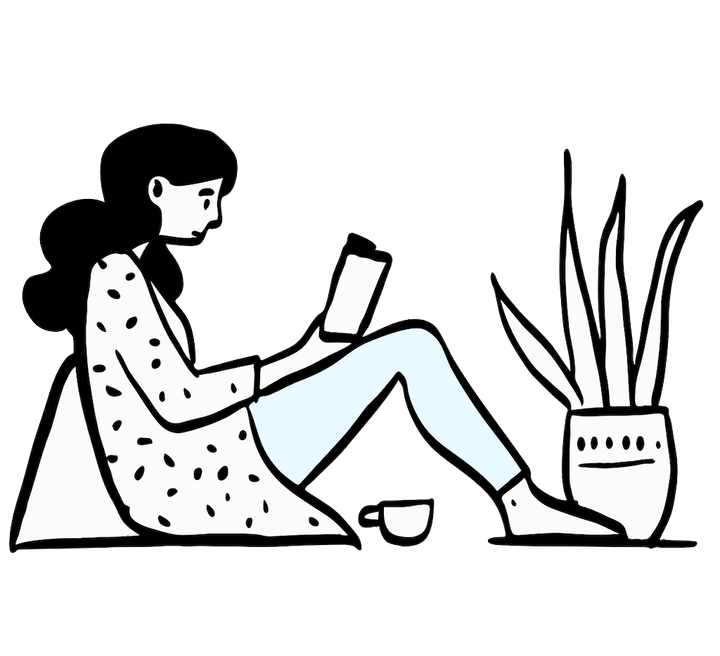What is self-care?
Self-care is the practice of taking care of ourselves so that we can stay physically, mentally, and emotionally well.
While we all have different ways of practising self-care, the ultimate goal is to make sure we spend time doing things that:
- Make us feel happy and healthy
- Lower our risk of disease and illness
- Help us manage stress or cope during challenging times
- Allow us to feel physically and psychologically safe
- Promote strong social connections.
Sometimes, self-care activities don’t require much thought - like brushing our teeth or having a coffee with a friend.
But other self-activities are more deliberate - like taking time away from technology, journaling our thoughts and feelings, or booking an appointment with a therapist.
Ultimately, a self-care activity is something that fills our ‘wellbeing cup’ instead of emptying it.
Why is self-care important?
An easy way to understand the importance of self-care is to think of yourself as a laptop computer. It doesn’t matter if you spend the entire day using it to study for exams, play a game, or host a video conference for work, at some point, you’re going to have to recharge the battery.
But of course, we can’t just plug ourselves into a power point …
Instead, we recharge by:
- Sleeping enough
- Eating well
- Moving our bodies
- Connecting with people
- Doing activities we enjoy.
These five areas (sleep, nutrition, movement, connection, and fun) are proven to have huge impacts on our mental health and wellbeing, which is why being proactive about your self-care can be so beneficial.
On top of making sure our basic needs are being met, self-care helps us stay focused on the things that matter to us, establish personal and professional boundaries, and find support when something challenging comes up.
Self-care can:
- Enable us to build strong social connections and form healthy relationships
- Prevent burnout by encouraging us to adopt sustainable work/study/volunteer habits
- Help us manage people and situations that may make us feel stressed and overwhelmed
- Give us ways to manage the symptoms of mental health conditions like anxiety, depression, and trauma
- Give us ways to cope and adapt when facing challenges like relationship problems, financial stress, grief, or an extreme weather event.
Making time for self-care can be difficult, especially when you’re working full-time, studying, or raising a family (or doing all those things at once!).
It can also be difficult to make self-care a priority if you don’t feel like you deserve it, or it won’t make a difference.
Feeling unworthy, undeserving, or hopeless can sometimes be signs of low self-esteem. If this sounds like you, please know that everyone deserves time and space to practise self-care.
Remember - self-care isn’t selfish.
We know self-care is important for good mental health and wellbeing, which is why you never need to feel guilty about making it a priority.
With that being said, when you’re stressed, depressed, or just feeling a bit flat, it can be difficult to find the energy to even think of how you can practise self-care.
Having a pre-prepared self-care plan, like a self-care box, can be helpful when moments like these hit unexpectedly. This is because it removes the pressure of needing to think about what to do during tough times.
Finding the right self-care for you
Even though a self-care activity like cuddling puppies might be something a lot of people would enjoy, it’s likely that what fills your cup won’t fill someone else's.
And contrary to what someone on social media might tell you, self-care doesn’t have to involve expensive moisturiser, a remedial massage, or an expensive gym membership. In fact, it doesn’t have to cost a thing.
Here are some examples of self-care choices you can make that are free:
- Saying no to a late night out
- Taking time to cook a nice meal
- Going for a walk before work
- Calling a friend for a chat
- Playing board games.
It’s important to point out that when we’re really struggling, sometimes the only self-care we can practise is literally just making it out of the house to get some sunshine, and that’s okay.
Even the smallest amount of self-care can be beneficial.
Scroll down to learn more self-care ideas that might work for you.
Self-care ideas
- Create a morning and evening self-care routine
When we’re feeling overwhelmed or low, it’s easy to be too busy, too tired, or just too ‘can’t be bothered’ to think about how to face and end the day.
Creating morning and evening routines (and sticking to them) can be really helpful because they make it easy to reach for the self-care activities you know work for you.
In the morning, your self-care routine could look like:
- Not reaching for your phone for the first 10 minutes after waking
- Drinking a glass of water or cup of coffee outside in the morning sunlight
- Reading something non-news, non-school, or non-work related
- Meditating for 5-10 minutes
- Setting an intention for the day. For example: ‘I want to feel grateful today.’
In the evening, your self-care routine could look like:
- Watching the sunset outside or through a window
- Having a cup of tea while chatting with a friend or family member (in person or over the phone)
- Writing down three things you’re grateful for
- Stretching
- Listening to a sleep story or guided meditation track.
- Move your body
- Spend time in nature
- Connect with others
The power of speaking with someone you trust
Many people find that talking to someone when they’re feeling anxious or low is so helpful that they wish they had done it sooner.
If you want to learn more about how to talk to someone you trust when you’re going through a tough time, click here. If you're not ready to take that step with someone in your life just yet, Lifeline is always here for you.
- Enjoy music, podcasts, books, or movies
- Volunteer in the community
- Keep your hands and mind busy
- Meditate
- Prioritise good food
- Have a bath
- Practise mindfulness
- Journal your thoughts and feelings
We know that if a loved one was feeling overwhelmed, we would encourage them to reach out for support. However, we tend to be harder on ourselves when considering asking for help.
Self-care means caring for yourself exactly like you would a loved one.
If you'd like to find ways to connect with people who can help, you can:
- Learn how and why to talk to someone you trust
- Read our tips for finding the right therapist for you
- Consider getting a Mental Health Treatment Plan.
Remember that Lifeline is always here to listen.











